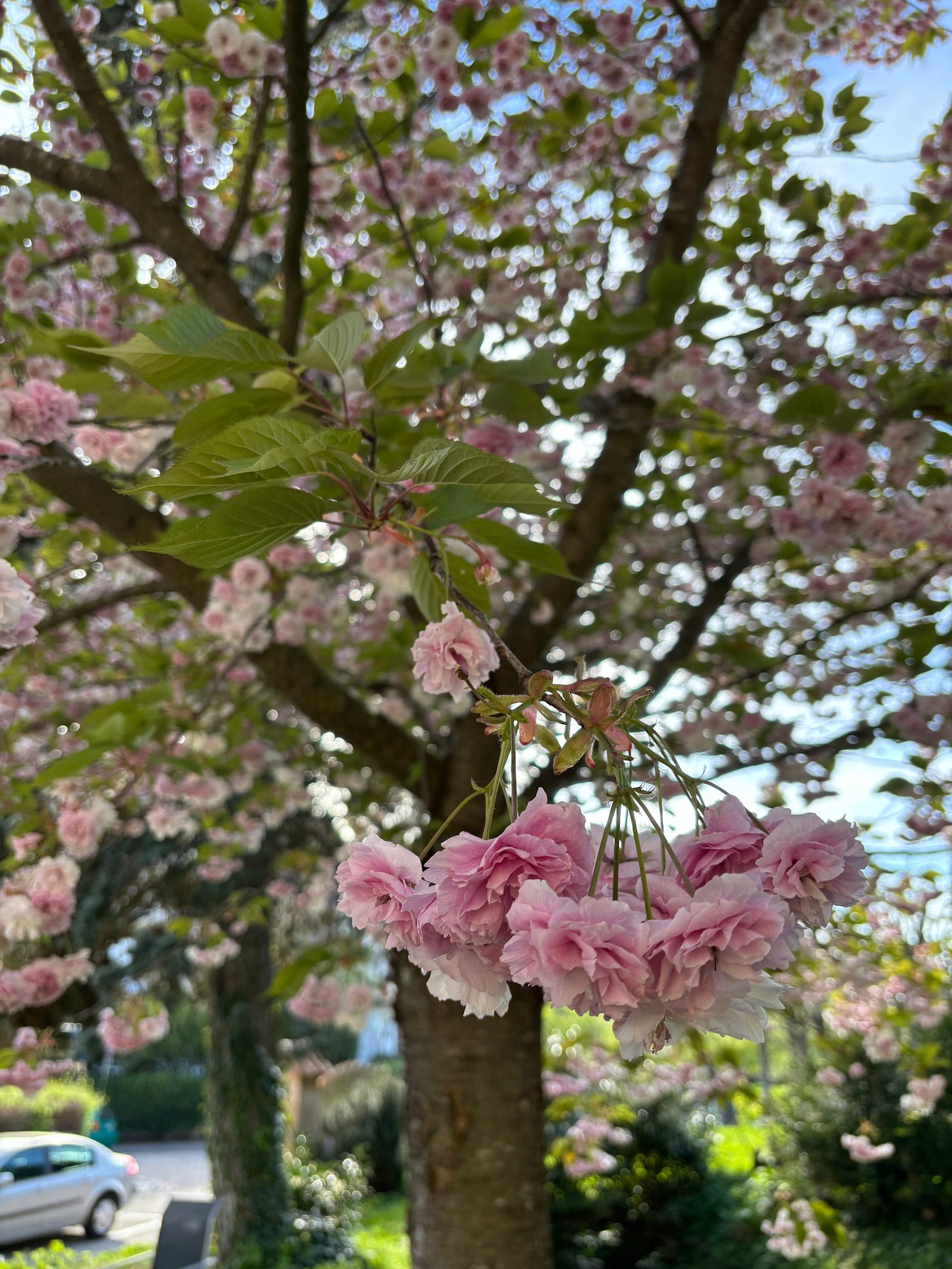For a brief moment of lightness, I became heavy
On freedom, connection, and the lasting impressions we will leave behind.
Spring arrives for me when the city bursts into shades of pink—one Sakura tree after another in bloom (or Kirschbaum, as we call it here in Germany).
Sakura always reminds me to pause—to be awed by the quiet beauty of life. And in that same breath, it clutches my heart, whispering the futility of holding on to any of it. - my Note
It embodies the beauty of life and the sense that it is all worth it—the slow, patient growth from seed to tree, the wait in dormancy all year, and the brief moment of glory before shedding all its petals like gossamer in the wind1.
The Sakura tree and its glorious yet fleeting bloom embody both lightness and heaviness.
This reminded me of Kundera's novel The Unbearable Lightness of Being. During one of our long conversations about the meaning of life, a friend in the Philippines implored me to read it. With the urgency of an impending assignment, I sought out the book immediately and consumed it.
The novel was my first foray into the world of philosophical fiction. I absorbed many ideas and terms—kitsch, the eternal return, vertigo—but the message that got me most was: Why live and strive for meaning when it is all so fleeting and never to return? Or should we live because of it?
Lightness, like the Sakura bloom, brings us beauty, sweetness, and all the pleasures in life.
Heaviness is the tree itself, ever connected to its roots, standing tall after so many years of slow growth and waiting patiently for its yearly bloom.
I value freedom. As Kundera explored in his novel, it represents lightness—freedom from society’s expectations, rules, laws, and systems. But it is also physical—a freedom not rooted to a place or attached to a person, transcending space and perhaps time without limits.
Then again, I also value love and connection, which represent heaviness.
Can one have a connection with oneself and others while maintaining one's freedom?
To an extent, possibly.
I am now bound by my obligations as a mother and wife, but the freedom to choose remains. Or not? Can I drop everything now and go for a one-month backpacking trip somewhere alone?
In theory, I can, but the consequences are significant. A mom’s guilt cannot be underestimated. So no, not really. I have tethered myself—consciously—by love.
As Kundera asked, “Muss es sein?” (Must it be?) In my freedom, I once felt light. But now, tethered by love, I answer, “Es muss sein” (It must be).
When I traveled alone, I was truly happy with the freedom, the lightness of life, akin to Sabina in the novel, who embraced freedom as a rebellion—a refusal to be fixed in a place or defined by others' expectations. And like her, I, too, found liberation in anonymity, adventure, exploration, and brief but vivid connections with strangers.
I forged real connections with some travelers on the road. At the same time, I learned to bid them farewell and wish them a good life when it was time to part, shedding attachment but holding on to our shared memories as an everlasting imprint.
Even though all things in life are transitory in the cosmic view, some are lighter and some are heavier. Some are light, like a chance encounter on the road. Others are heavy, like a lifetime with biological family, lifelong friends, a partner, or children.
Light in time does not mean light in meaning. A deep connection formed by chance may leave a more lasting imprint than a fragile bond that spans a lifetime.
Those travelers I connected with changed me subtly, in ways I don't always realize, and I, too, may have changed them in ways I'll never know. I carry a part of them with me, no matter how small. And they, too, carry me now all over the world. And with time, by the virtue of compounding, the impact would not have been insignificant.
With our life partners and children, our impact on them is markedly more profound, and no doubt more apparent.
The voices of my ancestors echoed through the core beliefs I hold. As much as I try to sift through them, choosing what to pass on and what to leave behind, I know I will inevitably take part in shaping the core beliefs my children will come to carry.
And like those ancestral whispers, my mark will outlive me, perhaps altered, perhaps faint—carried on through generations by bloodlines and connections.
This is where heaviness comes in. Our lives can be heavy despite their lightness.
Conscious living seems light at first glance. Being mindful of every moment seems light, as we all know how quickly the moment passes.
Being conscious is about living in the now. The past has gone, and the future has yet to come.
Our human nature of holding on to the past and looking to the future is our attempt to make our light, fragile life heavy.
But if we live only in the now, doesn't that make the now eternal? Instead of living in the past or the future, we are always in the now that will ever be.
And what is that if not heavy?
We can live consciously in lightness by appreciating every transitory beauty—a chance encounter, a Sakura in bloom, a journey without destination, a quiet rebellion against systems, dogmas, and social chains.
But we can also live consciously in heaviness by valuing genuine connections, practicing compassion, and spreading genuine love, knowing that all the impressions we leave behind may last long after we are gone.
Even the most ancient trees are transitory, yet they represent heaviness. Touching a few thousand-year-old cedar tree in Yakushima, Japan, as the four-day rain relentlessly poured on us, I communed with humanity’s distant ancestors from millennia ago.
For a brief moment of lightness, I became heavy.
You may also be interested in:
I have a vivid memory of reading a poem, or perhaps a short story, by that name when I was a child. It was likely in some old magazine I stumbled upon, and as far as I can remember, it was my first brush with poetic prose, where a few words could hold something so profound and beautiful that you couldn’t help but be swept away.
I had to look up the word gossamer back then, but it had me at first read. I loved how it sounded—light, delicate—the way it rolled off the tongue like Sakura petals frolicking in the air on their slow descent to earth.






